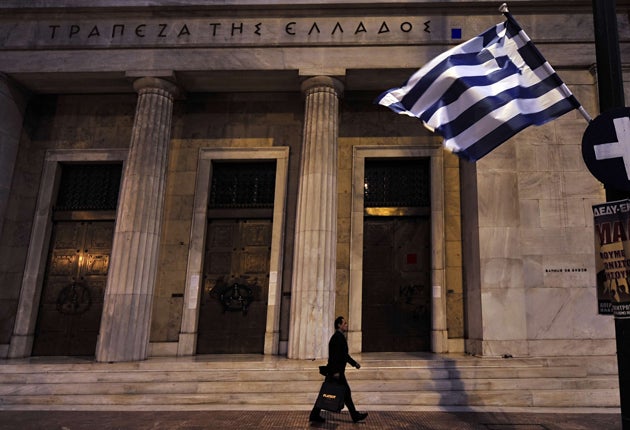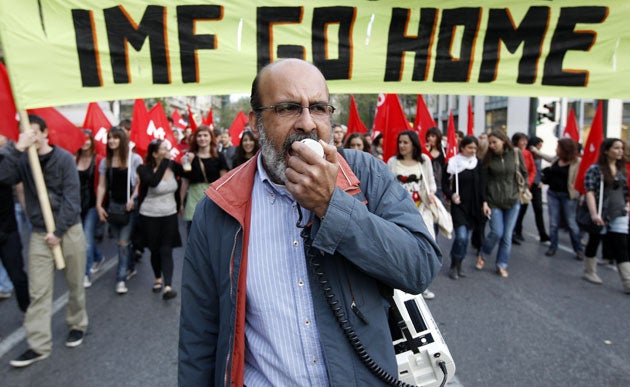Satyajit Das: Greece has plenty of options. It's just that none of them are good
Das Capital: A Grexit without contagion? It's like Dr Strangelove's belief in survivable nuclear war

The choices for Greece now are clear.
In the first option, the European Union makes allowances: maturities for loans, especially short-term ones, are extended; there are concessions on interest rates; debt may be replaced with securities without maturity and a coupon linked to growth – Keynes-style “Bisque bonds”; the European Central Bank continues to support the liquidity needs of the Greek banks; and the hated Troika is renamed, to remove the odious association with the past.
Despite the reduction in the value of the debt outstanding, the EU and lenders avoid a politically difficult explicit debt writedown. Syriza claims to have fulfilled its mandate to stand up to the EU and Germany, and reclaim Hellenic sovereignty and pride.
In reality, little changes. Under this scenario, Greece and the EU are back at the negotiating table within six to 12 months, confronting the same issues.
In the second option, Greece defaults on its debt but stays in the euro. (It is not clear how a nation in default can remain within the euro other than through the fortuitous absence of an ejection mechanism.) Greek banks collapse if the ECB decides to withdraw funding. Capital flight accelerates, requiring capital controls. The Greek Government is left with no obvious source of funding, other than a parallel currency or IOUs, as used during some government shutdowns in the US. Greece’s competitive position is unchanged as it purports to use the euro. The EU and lenders incur substantial losses on their loans.
In the third option, Greece defaults and leaves the euro, bringing in new drachmas. There is short-term chaos. Activity in Greece collapses. The EU and lenders face the same problem as in the second option. In addition, the euro is destabilised.
The third option allows Greece to regain control of its currency and interest rates. Sharp devaluation of the new drachma improves competitiveness, for example in tourism. The ability of the central bank to create and control money supply helps restore liquidity to its banks and provides a mechanism for financing the Government.
A cheap new drachma, if appropriately managed, may reverse capital flight, as the threat of a loss of purchasing power is reduced. A devalued currency may also help attract inflows of funds looking for bargains. In time, Greece regains access to capital markets as Russia did after its 1998 default.
Greece regains economic sovereignty but at the cost of reduced living standards as import prices sky-rocket and international purchasing power is diminished. But after the initial dislocation, a strong recovery may ensue.

The fourth option entails Greece caving into EU demands and continuing with austerity. Syriza may be able to manage the backlash against its concession on the short-term extension. But equally, the governing coalition may collapse, triggering elections.
Syria may return with a specific mandate to default and leave the euro. Alternatively, the Greeks may turn to the fascist, rabidly anti-Europe and anti-euro Golden Dawn party. A reversion to military rule, which only ceased in 1974, cannot be ruled out. The underlying economic problems remain.
Given the effects of existing policies on the Greek people, continued or further hardship is not a big threat. The EU and German assertion that a Greek default and exit from the euro (Grexit) is manageable with little risk of contagion is, hopefully, only a negotiating stance. It is akin to Dr. Strangelove’s belief in survivable thermo-nuclear war.
With around 85 per cent of Greek debt owed to official lenders, Grexit would immediately trigger significant losses on bilateral government loans, ECB holdings of bonds, and the loans made by bailout funds and under the Target settlement system.
The total amount at risk is about €256bn (£182bn). The exposure of Germany, France, Italy, Spain, the Netherlands and Finland are €73bn, €55bn, €48bn, €33bn, €15bn and €5bn respectively.
Grexit would also trigger capital flight from other vulnerable nations. Access to money markets for such states would fall and borrowing costs rise. The euro would become volatile. If the assumption is that the euro becomes the new German mark for a smaller eurozone group, it might appreciate sharply, reducing German export competitiveness.
It could also provide impetus to nationalist eurosceptic parties such as Ukip, Spain’s Podemos, France’s Front National and Germany’s AfD.
Once Greece defaults and/or leaves the euro, it would be hard to stop speculation about other peripheral nations, undermining the basis for the euro. Even without a full Grexit, any concessions to Greece would result in other countries seeking relaxation on budgets and reform. Debt and fiscal sustainability within the eurozone would become unachievable. There are no good options left to resolve the Greek crisis.
Satyajit Das is a former banker and author of ‘Extreme Money’ and ‘Traders, Guns & Money’
Join our commenting forum
Join thought-provoking conversations, follow other Independent readers and see their replies
Comments
Bookmark popover
Removed from bookmarks